Washington
10 February 2009
 |
| Treasury Secretary Timothy Geithner speaks in Washington on economic plan, 10 Feb 2009 |
U.S. Treasury Secretary Timothy Geithner on Tuesday unveiled the Obama administration's plan to remove bad debts from the banking system and restore the confidence needed for normal lending to resume. The new effort likely will cost a huge sum of taxpayer money.
Geithner says the government will do all that is necessary to save the nation's banking system. U.S.-based financial institutions remain distressed 18 months after the onset of a credit squeeze caused by bad loans to the housing sector. Thus far, injections of hundreds of billions of dollars in government money to banks have failed to resolve the problem.
He said that in some respects, the problem has worsened and that the financial system is seriously damaged. "The credit markets that are essential for small businesses and consumers are not working. Borrowing costs have risen sharply for state and local governments, for students trying to pay for college and for businesses large and small. Many banks are reducing lending, and across the country they are tightening the terms of loans," he said.
At the center of Geithner's plan is a public-private partnership to buy as much as $1 trillion of bad loans still on the books of financial institutions. And another $1 trillion could be made available to boost bank lending.
Geithner said there had been a sudden loss of confidence in the financial system and that his plan entails a reshaping of the system. "This strategy will cost money. It will involve risk. And it will take time. But as costly as this effort may be, we know that the cost of a complete collapse of our financial system would be incalculable for families and businesses and for our nation," he said.
Wall Street was unimpressed with the Geithner plan and financial stocks sold off sharply. Analysts complained about a lack of specific measures and disliked the Treasury secretary's reference to banks being subjected to a medical-like stress test to determine whether they should receive more government money.
Other analysts said Geithner's plan represents a compromise, attempting to reconcile public anger about excesses in the banking system, while cajoling banks to boost lending.
Geithner said he will seek support for his plan and coordinate measures with other governments when he meets this week with finance leaders from the Group of Seven leading industrialized nations in Rome.